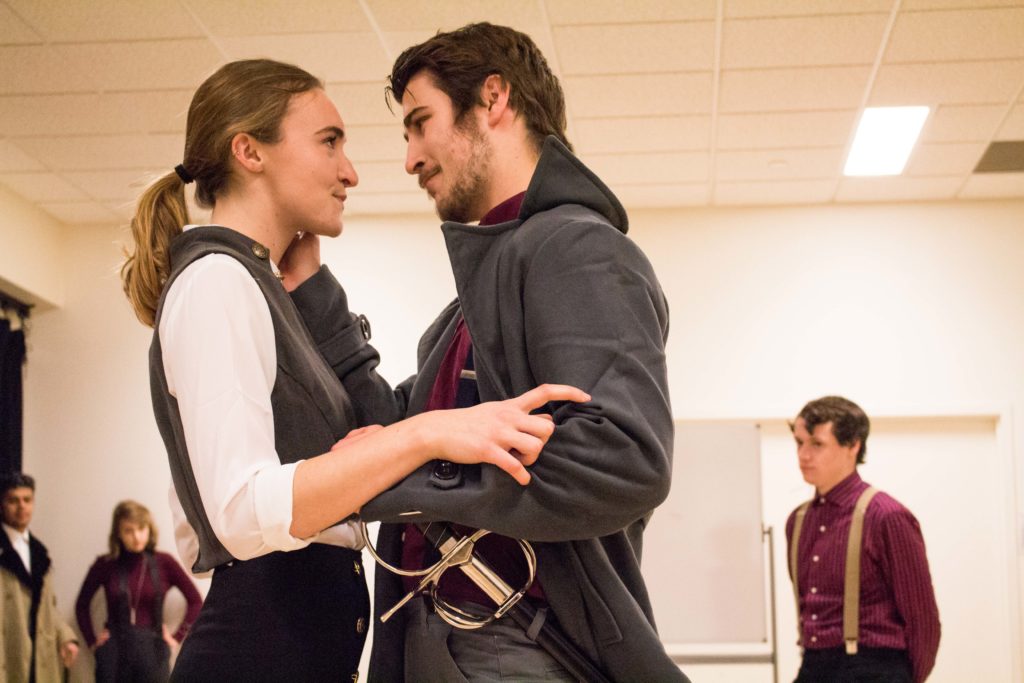By Oriana Timsit, news correspondent
A week after Acting Out’s strong performance of “A Streetcar Named Desire,” Northeastern’s Shakespeare Society will be tackling another well-known tragedy: “Macbeth.”
The Shakespeare Society is a student-run organization that brings together members from various academic backgrounds to put on two Shakespeare plays per year. This is not only the group’s first performance of the year, but it is also the group’s first performance without all of its founding members.
Set in Scotland, “Macbeth” is a story about ambition and paranoia explored through one character’s slow descent into madness as he is exposed as either cruel in nature or the puppet of fate and temptation. These are just two of the many interpretations that actors and directors alike can work with. Because of these intense themes, the characters, particularly Macbeth, are demanding roles for actors.
“Playing Macbeth means playing with raw emotion displayed by the character and pushing psychological boundaries,” said Adam Thomas, a fifth-year physical therapy major. “So it has been intense but fun.”
If Macbeth himself faces difficulties — such as strange witches predicting his ascent to power — they are only enhanced by the complex dynamics between him and his wife, Lady Macbeth. This mythical couple is said to have influenced characters in pop culture such as Claire and Frank Underwood in the television show “House of Cards,” which was, as a whole, inspired by other Shakespeare plays such as “Richard III” and “Othello.”
Why do plays like “Macbeth” still impact the creation of new work in theater, cinema and literature today? Some would argue that the timeless nature of the themes in all of Shakespeare’s plays allows directors to create a unique interpretation by experimenting with set design. The director, Luke Heeringa was inspired by psychological thrillers and retro aesthetics.
“[I have] taken liberties with some of the characters to provide new context,” Heeringa said. “The characters are the same, but their stories have been altered and mixed up to better represent a contemporary setting.”
Isaac Shur, who plays Ross in the production, described the show as “Macbeth” with a 1960s “Twilight Zone” twist and music taken from the ‘40s to the ‘60s. Since this is one of Shakespeare’s more violent plays, it will also involve a lot of fake blood.
“The sounds, costumes and set come together to create a horror play, fitting just a few weeks after Halloween and the premiere of ‘Stranger Things 2,’” Shur said.
Aside from the stagecraft, deliberate emphasis has been placed on the exploration of gendered roles in this production.
“Ambition really is seen differently depending on gender,” Heeringa said.
Although Lady Macbeth’s character is omnipresent and among the most well known in western literature, the play itself is sparse in female characters. Heeringa countered this by giving roles originally performed by men to women actors. For example, Olivia Overington, a first-year psychology major, plays a total of three parts, all of which are originally male roles. Through this decision, Heeringa said he hopes to explore the different expectations and reactions audiences have for men and women.
“The question of gendered standards is just as relevant now as it would have been in the seventeenth century,” Heeringa said.
Although bad luck has often surrounded productions of the ‘Scottish play’ — so named as to avoid strange incidents often associated with saying the name “Macbeth” outside of rehearsals and performances — the cast is confident everything will run smoothly and any deaths or injuries will be those intended by the playwright more than four centuries ago.
The show will take place at the Ryder Theater Lab Nov. 17-19 at 7:30 p.m. Tickets are available on the group’s Facebook page.









